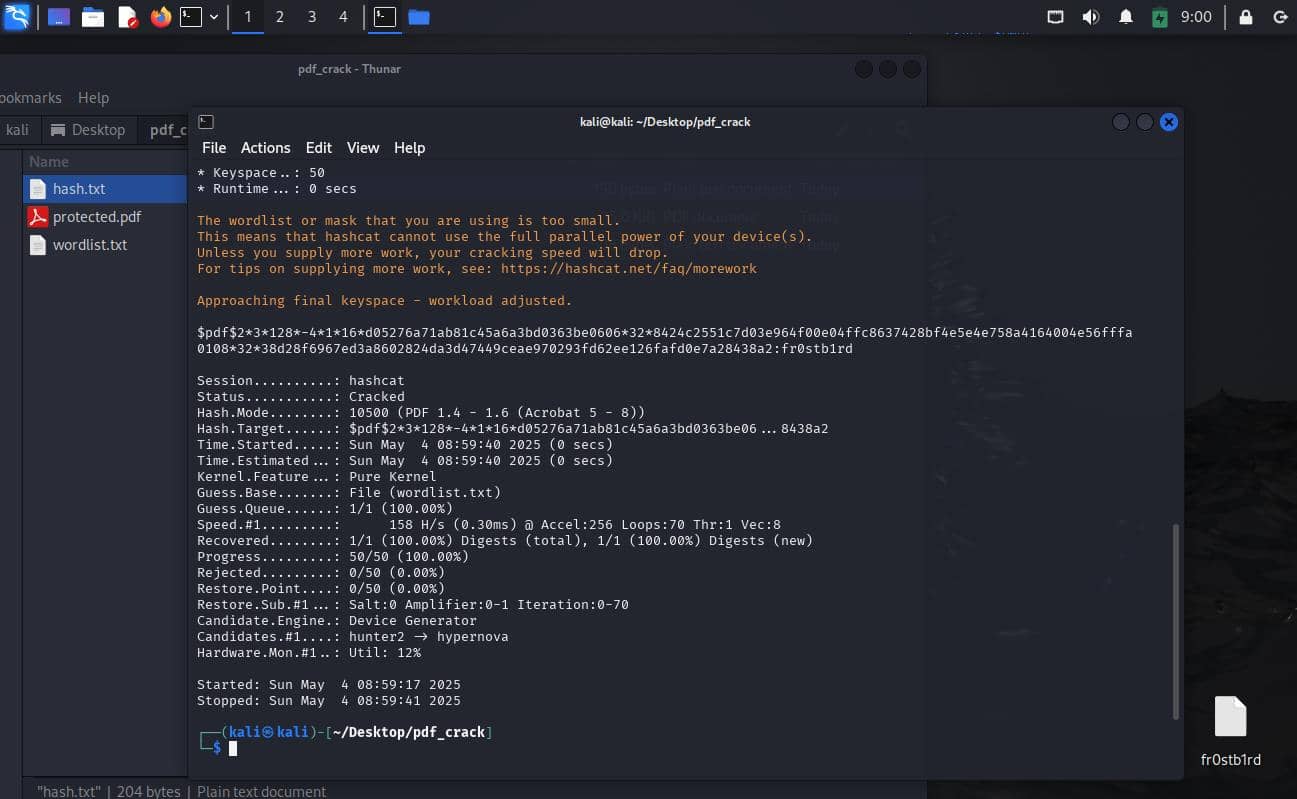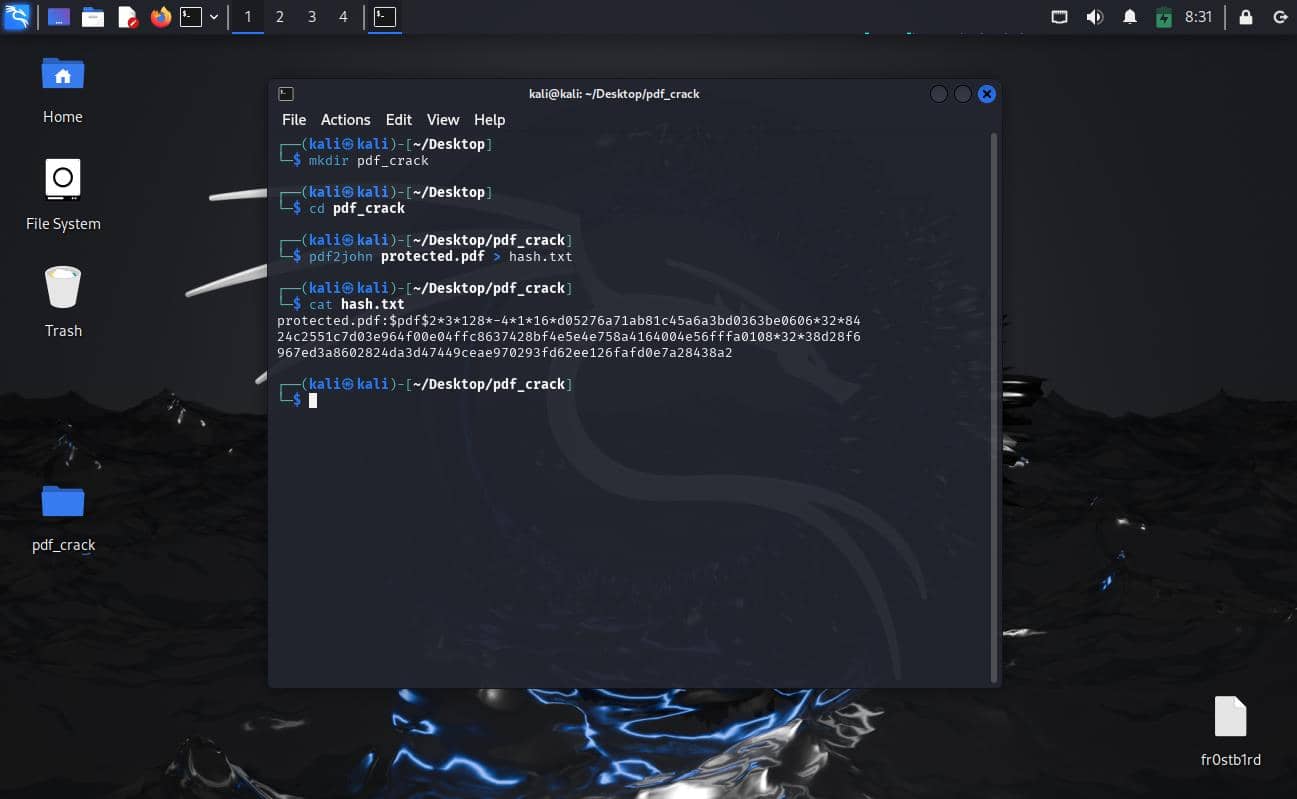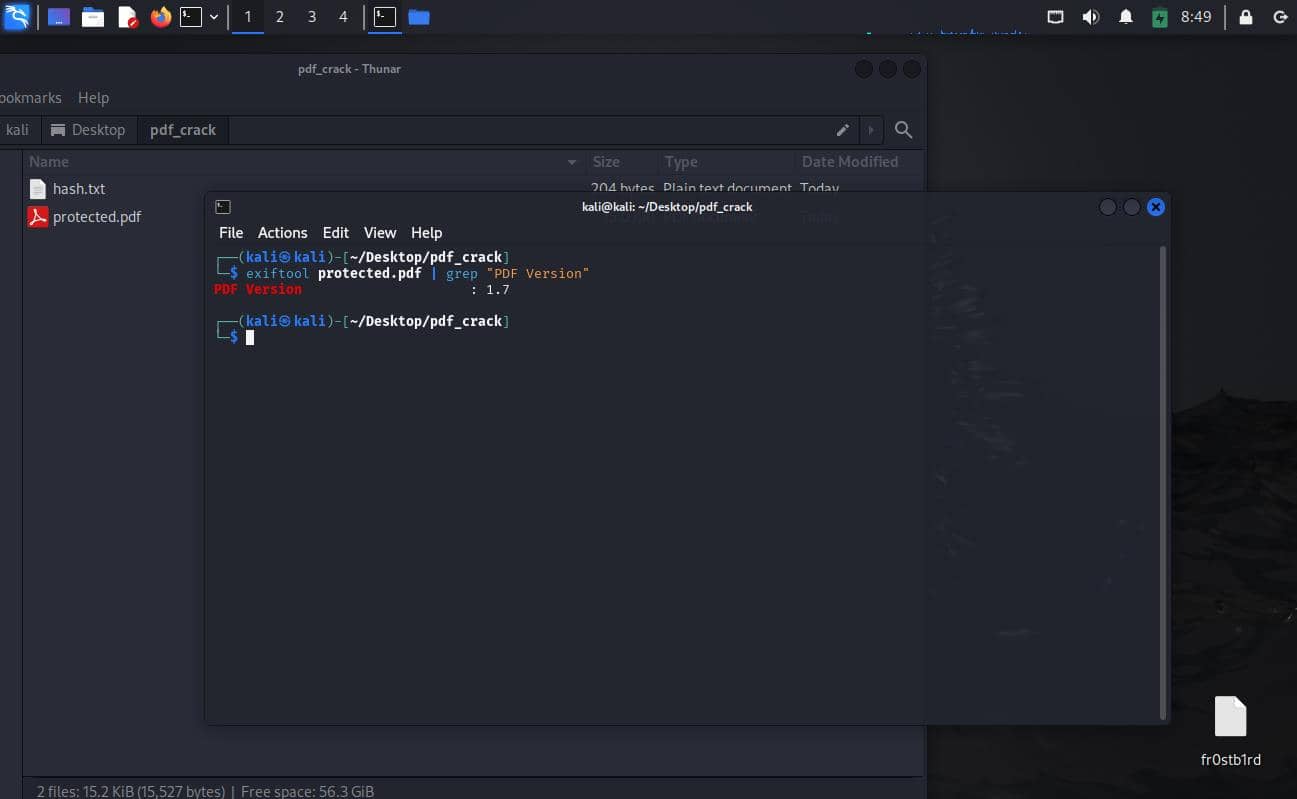Cracking PDF Password with Hashcat: A Step-by-Step Guide
Introduction
This comprehensive guide will teach you how to crack a password-protected PDF file using Hashcat on Kali Linux. Hashcat is a powerful password recovery tool that can crack various types of hashes, including those used to secure PDF files.
⚠️ Legal Disclaimer
This guide is for educational purposes only and is intended for:
- Security professionals conducting authorized penetration testing
- System administrators recovering access to legitimate files
- Security researchers studying password protection mechanisms
DO NOT use this knowledge for:
- Unauthorized access to protected documents
- Breaking into systems or networks
- Any illegal activities
Always obtain proper authorization before attempting to crack passwords. Unauthorized password cracking may violate local and international laws.
What You Need
1. System Requirements
Hardware Requirements
- CPU: Multi-core processor (more cores = faster cracking)
- GPU: NVIDIA or AMD GPU for hardware acceleration (optional but recommended)
- RAM: Minimum 8GB (16GB or more recommended)
- Storage: 20GB free space for wordlists
Software Requirements
- Kali Linux
- Latest version recommended
- Can be run from USB, VM, or native installation
- Other Linux distributions work too, but commands may vary
- Hashcat
- Pre-installed on Kali Linux
- Installation if needed:
sudo apt update && sudo apt install hashcat - Version 6.0.0 or higher recommended
- Check installation:
hashcat --version
- Required Tools
- John the Ripper (for pdf2john):
sudo apt install john - Python 3.x: Pre-installed on Kali
- Text editor (nano/vim)
- John the Ripper (for pdf2john):
2. Files Needed
- Password-Protected PDF File
- Supported versions: PDF 1.1 - 1.7
- File size: Preferably under 100MB
- Must be readable (not corrupted)
- Wordlist
- Default:
rockyou.txt(/usr/share/wordlists/rockyou.txt) - Download if missing:
1
sudo gunzip /usr/share/wordlists/rockyou.txt.gz - Other wordlists:
- SecLists:
sudo apt install seclists - Custom wordlists based on target
- SecLists:
- Default:
3. Optional Tools
- GPU Drivers
- NVIDIA:
sudo apt install nvidia-driver - AMD:
sudo apt install mesa-opencl-icd
- NVIDIA:
- Monitoring Tools
- htop:
sudo apt install htop - nvtop (for NVIDIA GPUs):
sudo apt install nvtop
- htop:
Step 1: Extract the Hash from the PDF
Before using Hashcat, you need to extract the hash from the PDF file. The hash is a cryptographic representation of the password protection mechanism used in the PDF. There are several methods to extract this hash.
Understanding PDF Password Protection
PDF files can be protected with two types of passwords:
- User Password (Document Open Password)
- Prevents opening the document
- Required for basic file access
- What we’ll be cracking in this guide
- Owner Password (Permissions Password)
- Controls document permissions
- Restricts printing, copying, editing
- More complex to crack
Option 1: Using pdf2john (Recommended Method)
pdf2john is the most reliable tool for hash extraction. It’s specifically designed to handle various PDF encryption methods.
Installation
1
2
3
# Install John the Ripper if not already installed
sudo apt update
sudo apt install john
Hash Extraction Steps
- Prepare Your Environment
1 2 3
# Create a working directory mkdir pdf_crack cd pdf_crack
- Copy Your PDF
1 2
# Replace /path/to/your.pdf with actual path cp /path/to/your.pdf ./protected.pdf
- Extract the Hash
1
pdf2john protected.pdf > hash.txt- Replace
protected.pdfwith your PDF filename - The
>operator redirects output to hash.txt
- Replace
- Verify the Hash
1
cat hash.txt
1
2
3
4
5
6
┌──(fr0stb1rd㉿kali)-[~/Desktop]
└─$ cat hash.txt
protected.pdf:$pdf$2*3*128*-4*1*16*d05276a71ab81c45a6a3bd0363be0606*32*8424c2551c7d03e964f00e04ffc8637428bf4e5e4e758a4164004e56fffa0108*32*38d28f6967ed3a8602824da3d47449ceae970293fd62ee126fafd0e7a28438a2
┌──(fr0stb1rd㉿kali)-[~/Desktop]
└─$
Understanding the Output
The hash output will look something like this:
1
protected.pdf:$pdf$4*4*128*fr0stb1rdfr0stb1rdfr0stb1rdfr0stb1rdfr0stb1rdfr0stb1rdfr0stb1rdfr0stb1rd...*1*16*fr0stb1rdfr0stb1rdfr0stb1rdfr0stb1rdfr0stb1rdfr0stb1rdfr0stb1rdfr0stb1rd
Let’s break down the components:
$pdf$: Format identifier4: PDF version128: Key length- Rest: Encryption data
Remove
protected.pdf:from the output to get the hash only.
Your hash.txt file should look like the following:
$pdf$2*3*128*-4*1*16*d05276a71ab81c45a6a3bd0363be0606*32*8424c2551c7d03e964f00e04ffc8637428bf4e5e4e758a4164004e56fffa0108*32*38d28f6967ed3a8602824da3d47449ceae970293fd62ee126fafd0e7a28438a2
Option 2: Using a Python Script (Alternative)
If pdf2john doesn’t work, you can try the Python script pdf2Hashcat.py as an alternative. Be cautious when running this script as it may not be as reliable as pdf2john. Search for pdf2Hashcat.py online and download the script
Step 2: Identify the Hash Type
Hashcat requires you to specify the correct hash type for successful password recovery. PDF files use different hash types based on their version and security settings.
PDF Version and Hash Type Mapping
| PDF Version | Acrobat Version | Hash Type | Security Features |
|---|---|---|---|
| 1.1 - 1.3 | Acrobat 2 - 4 | 10500 | Basic RC4 encryption |
| 1.4 - 1.6 | Acrobat 5 - 8 | 10600 | Enhanced RC4/AES |
| 1.7 Level 3 | Acrobat 9 | 10700 | AES-128 |
| 1.7 Level 8 | Acrobat 10 - 11 | 10400 | AES-256 |
How to Check PDF Version
- Using exiftool:
1 2 3 4 5
# Install exiftool sudo apt install exiftool # Check PDF version exiftool protected.pdf | grep "PDF Version"
- Using pdfinfo:
1 2 3 4 5
# Install poppler-utils sudo apt install poppler-utils # Check PDF version pdfinfo protected.pdf | grep "PDF version"
- Manual Check:
- Open PDF in text editor
- Look for
%PDF-X.Xat the start
1
2
3
4
5
6
┌──(fr0stb1rd㉿kali)-[~/Desktop/pdf_crack]
└─$ exiftool protected.pdf | grep "PDF Version"
PDF Version : 1.7
┌──(fr0stb1rd㉿kali)-[~/Desktop/pdf_crack]
└─$
Step 3: Running Hashcat
Hardware Optimization
- GPU Setup (Recommended)
1 2 3 4 5 6
# Check GPU support hashcat -I # Enable GPU monitoring watch -n 1 nvidia-smi # For NVIDIA watch -n 1 radeontop # For AMD
- CPU Optimization
1 2 3 4 5
# Set performance mode sudo cpupower frequency-set -g performance # Monitor CPU usage htop
Attack Modes
- Wordlist Attack (Mode 0)
1
hashcat -m <hash_type> -a 0 hash.txt wordlist.txt
- Combination Attack (Mode 1)
1 2
# Combine two wordlists hashcat -m <hash_type> -a 1 hash.txt list1.txt list2.txt
- Mask Attack (Mode 3)
1 2
# Pattern-based attack hashcat -m <hash_type> -a 3 hash.txt ?d?d?d?d?d?d # 6 digits
- Hybrid Attack (Mode 6)
1 2
# Wordlist + Mask hashcat -m <hash_type> -a 6 hash.txt wordlist.txt ?d?d?d
Advanced Options
1
2
3
4
5
6
7
8
9
# Basic command with options
hashcat -m <hash_type> -a 0 hash.txt wordlist.txt \
--status \ # Show progress
--status-timer 10 \ # Update every 10 seconds
-w 3 \ # Workload profile (1-4)
--force \ # Ignore warnings
-O \ # Optimize for 32 chars or less
--session mysession \ # Save session
-r rules/best64.rule # Apply rules
Performance Tuning
- Workload Profiles
-w 1: Low impact on system-w 2: Default balance-w 3: High performance-w 4: Maximum performance
- Kernel Optimization
1 2
# For better GPU performance hashcat --kernel-accel 1 --kernel-loops 1
- Memory Management
1 2
# Segment size adjustment hashcat --segment-size 512
Monitoring Progress
- Status Screen
- Speed: H/s (Hashes per second)
- Progress: % complete
- Time Remaining: ETA
- Recovered: Found passwords
- Save Progress
1 2 3 4 5
# Save session hashcat ... --session mysession # Restore session hashcat --session mysession --restore
- Output Options
1 2 3 4 5
# Save cracked passwords hashcat ... --outfile cracked.txt # Show cracked only hashcat ... --show
Start Cracking
1
hashcat -m 10500 hash.txt wordlist.txt
After running the command, you will see the progress of the cracking process. Be patient, it may take a while.
1
2
3
4
5
6
7
8
9
10
11
12
13
14
15
16
17
18
19
20
21
22
23
24
25
26
27
28
29
30
31
32
33
34
35
36
37
38
39
40
41
42
43
44
45
46
47
48
49
50
51
52
53
54
55
56
57
58
59
60
61
62
┌──(fr0stb1rd㉿kali)-[~/Desktop/pdf_crack]
└─$ hashcat -m 10500 hash.txt wordlist.txt
hashcat (v6.2.6) starting
OpenCL API (OpenCL 3.0 PoCL 6.0+debian Linux, None+Asserts, RELOC, LLVM 18.1.8, SLEEF, DISTRO, POCL_DEBUG) - Platform #1 [The pocl project]
============================================================================================================================================
* Device #1: cpu-sandybridge-16th Gen Intel(R) Core(TM) i9-12900KF @ 8.20GHz, 21593/50244 MB (21590 MB allocatable), 32MCU
Hashes: 1 digests; 1 unique digests, 1 unique salts
Bitmaps: 16 bits, 65536 entries, 0x0000ffff mask, 262144 bytes, 5/13 rotates
Rules: 1
Optimizers applied:
* Zero-Byte
* Not-Iterated
* Single-Hash
* Single-Salt
Watchdog: Temperature abort trigger set to 90c
Host memory required for this attack: 2 MB
Dictionary cache built:
* Filename..: wordlist.txt
* Passwords.: 50
* Bytes.....: 506
* Keyspace..: 50
* Runtime...: 0 secs
The wordlist or mask that you are using is too small.
This means that hashcat cannot use the full parallel power of your device(s).
Unless you supply more work, your cracking speed will drop.
For tips on supplying more work, see: https://hashcat.net/faq/morework
Approaching final keyspace - workload adjusted.
$pdf$2*3*128*-4*1*16*d05276a71ab81c45a6a3bd0363be0606*32*8424c2551c7d03e964f00e04ffc8637428bf4e5e4e758a4164004e56fffa0108*32*38d28f6967ed3a8602824da3d47449ceae970293fd62ee126fafd0e7a28438a2:fr0stb1rd
Session..........: hashcat
Status...........: Cracked
Hash.Mode........: 10500 (PDF 1.4 - 1.6 (Acrobat 5 - 8))
Hash.Target......: $pdf$2*3*128*-4*1*16*d05276a71ab81c45a6a3bd0363be06...8438a2
Time.Started.....: Sun May 4 08:59:40 2025 (0 secs)
Time.Estimated...: Sun May 4 08:59:40 2025 (0 secs)
Kernel.Feature...: Pure Kernel
Guess.Base.......: File (wordlist.txt)
Guess.Queue......: 1/1 (100.00%)
Speed.#1.........: 158 H/s (0.30ms) @ Accel:256 Loops:70 Thr:1 Vec:8
Recovered........: 1/1 (100.00%) Digests (total), 1/1 (100.00%) Digests (new)
Progress.........: 50/50 (100.00%)
Rejected.........: 0/50 (0.00%)
Restore.Point....: 0/50 (0.00%)
Restore.Sub.#1...: Salt:0 Amplifier:0-1 Iteration:0-70
Candidate.Engine.: Device Generator
Candidates.#1....: hunter2 -> hypernova
Hardware.Mon.#1..: Util: 12%
Started: Sun May 4 08:59:17 2025
Stopped: Sun May 4 08:59:41 2025
┌──(fr0stb1rd㉿kali)-[~/Desktop/pdf_crack]
└─$
If the password is cracked successfully it will give you the hash along with the password, as shown below:
1
$pdf$2*3*128*-4*1*16*d05276a71ab81c45a6a3bd0363be0606*32*8424c2551c7d03e964f00e04ffc8637428bf4e5e4e758a4164004e56fffa0108*32*38d28f6967ed3a8602824da3d47449ceae970293fd62ee126fafd0e7a28438a2:fr0stb1rd
The password is: fr0stb1rd
Pot File
Hashcat writes all cracked hashes to a pot file. The pot file is a text file that contains the cracked hash and the password.
1
2
3
4
5
6
7
┌──(fr0stb1rd㉿kali)-[~/Desktop]
└─$ cat ~/.local/share/hashcat/hashcat.potfile
$pdf$4*4*128*-4*1*16*489810bcd5953bf4871f6ee95308f7c6*32*021eacdfc91fb1d57e46fb8c0ea50c9b28bf4e5e4e758a4164004e56fffa0108*32*9a79d589019a7d332527723a4df175c6b3c192574569fc487c3437c25ea5024f:istanbulTURKEY
$pdf$2*3*128*-4*1*16*d05276a71ab81c45a6a3bd0363be0606*32*8424c2551c7d03e964f00e04ffc8637428bf4e5e4e758a4164004e56fffa0108*32*38d28f6967ed3a8602824da3d47449ceae970293fd62ee126fafd0e7a28438a2:fr0stb1rd
┌──(fr0stb1rd㉿kali)-[~/Desktop]
└─$
You can find the pot file in ~/.local/share/hashcat/hashcat.potfile.
Conclusion
Successful PDF password recovery with Hashcat requires:
- Correct hash type identification
- Appropriate attack strategy
- Optimized hardware usage
- Patience and persistence
Remember: This knowledge should only be used for legitimate password recovery scenarios.
Resource Usage: Monitor system resources carefully. Password cracking can be intensive on hardware.
Time Estimation: Success rate varies greatly based on password complexity and hardware capabilities.
Note: Hashcat is a powerful tool, but it should be used responsibly. Unauthorized password cracking may be illegal.


